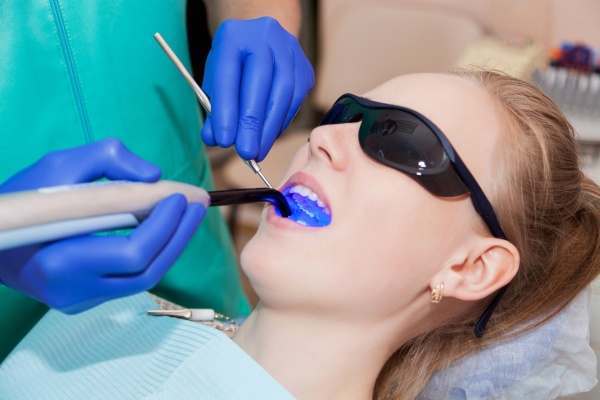In-Office Teeth Bleaching and Whitening: Are They the Same Thing?

With both teeth bleaching and teeth whitening being common terms, it can be confusing to understand the important differences. Both of these processes can be effective; however, they diverge on a few points. The methodology and chemistry of each vary, as do the results, which may vary depending on the severity and duration of the discoloration.
What causes teeth to become discolored and what are the options for treatment?
Teeth have a natural whiteness, but cola, strongly colored foods, coffee, tea, red wine and smoking all contain chemicals that can discolor the teeth. Certain medications can cause discoloration in the layers beneath the enamel. Bleaching and whitening can each improve the appearance of the teeth, but there are differences in how this is achieved.
What are the similarities between in-office teeth bleaching and whitening?
Both processes entail taking a mold of the teeth, from which trays are made. The flexible trays are fitted to every nook and cranny of tooth surfaces. This allows the brightening medium to sit closely next to the teeth. Once the custom trays are made, they are filled with a chemical gel that removes stains from the teeth.
What are the differences?
Whitening is a method that helps remove surface stains and discoloration caused by foods as well as some minor staining from tartar or plaque, both of which need to be removed by cleaning before the whiteners are used. Whitening removes and lightens the enamel surface of organic teeth, making it as close to their natural color as possible. Whiteners can be found in toothpaste, gum and mouthwash as well.
Bleaching, on the other hand, involves a stronger mixture containing either hydrogen or carbamide peroxide, chemicals that can penetrate beneath the surface of the tooth’s enamel. The peroxides enter the deeper levels of the teeth called dentin through minute fissures and microfractures that, over time, can also become stained by various means. The effect achieved by in-office teeth bleaching is often an extremely white smile, brighter than the natural tooth color.
Who is a candidate to receive either treatment?
Bleaching is a good option for those who have a history of drinking or eating the foods which enter the teeth and cause staining in the already more-yellowish dentin layer. Deep staining due to the use of certain medications or long-time food stains may also be relieved by bleaching. The level of whitening may be determined by the genetic color of a person’s dentin.
Whitening only removes staining from surface enamel. The teeth return to the teeth’s natural color. Bleaching not only brightens the enamel but also reaches more deeply into the dentin layer to remove the yellow discoloration that shows through the enamel.
Conclusion
For those whose self-esteem suffers because of stained and discolored teeth, teeth bleaching can be the answer. Cleaning not only the surface enamel but also deep into the yellow dentin layer, this process can reverse staining and add brighter level of whitening for a gleaming and more self-confident smile.
Request an appointment here: https://familychoicedentistry.com or call Family Choice Dental at (505) 634-5657 for an appointment in our Albuquerque office.
Check out what others are saying about our services on Yelp: Read our Yelp reviews.
Related Posts
Oral cancer screening is an essential preventive measure in maintaining overall oral health. The early detection of oral cancer can significantly improve the chances of successful treatment and recovery. As a general dentist, it is vital to inform patients about the importance of regular oral cancer screenings and how these screenings can help identify potential…
Considering a smile makeover and not sure where to start? Read on to learn more. Many people avoid smiling due to dental imperfections. A smile makeover may be the answer. A dentist can improve your smile with cosmetic procedures like teeth whitening, bonding, and veneers. The right professional for the treatment is the key to…
Sometimes, it takes more than one procedure to get the smile of your dreams. A dental provider can create a custom plan called a smile makeover to enhance different aspects of your smile. It is best to ask a provider if a smile makeover is right for you, as they can give personalized professional advice.…
If your teeth are spaced irregularly, you might not have great self-esteem and may consider trying teeth straightening. Plus, the issue might change your oral hygiene habits. One reason is that food might get stuck in them and be difficult to remove. That can weaken the teeth and gums, leading to complications. Keep reading to…
